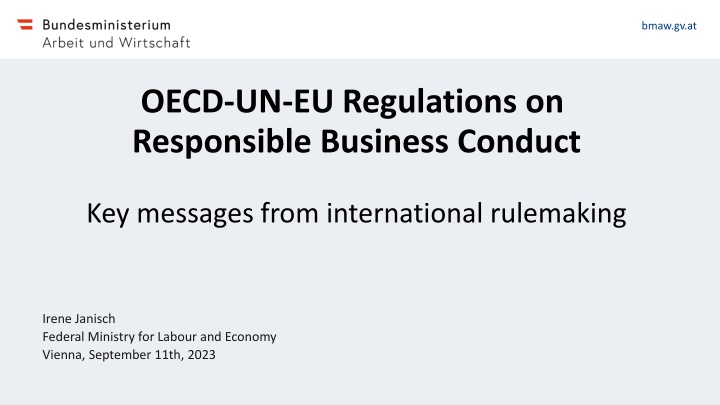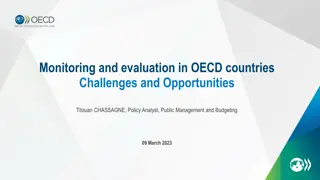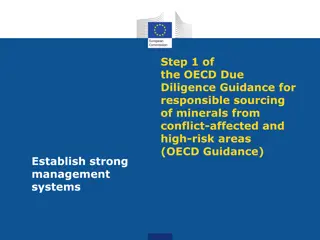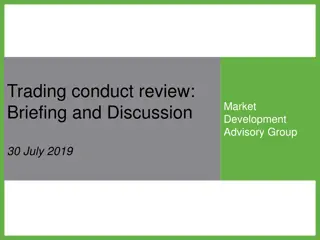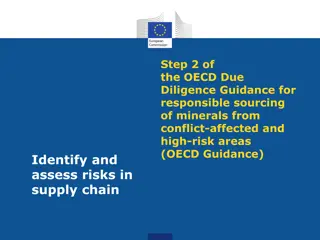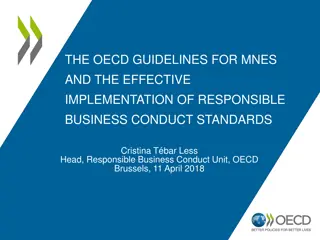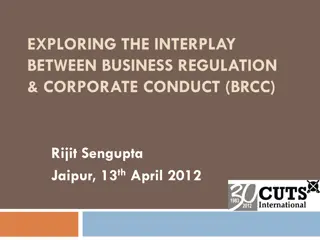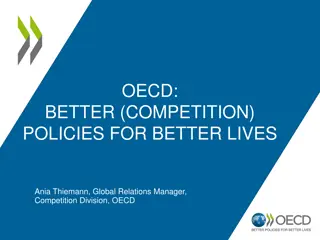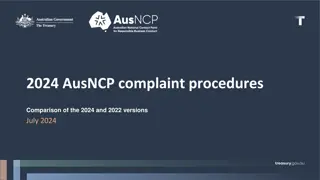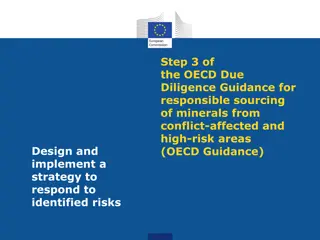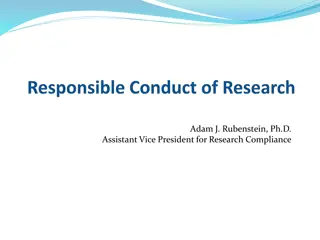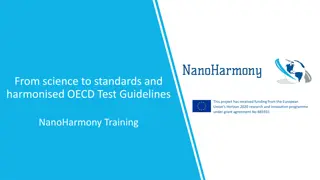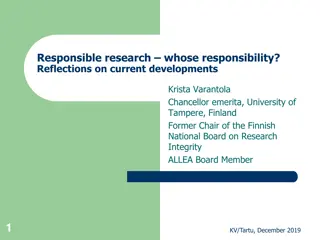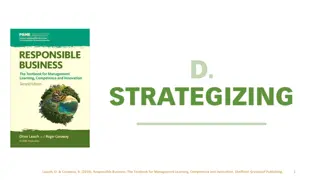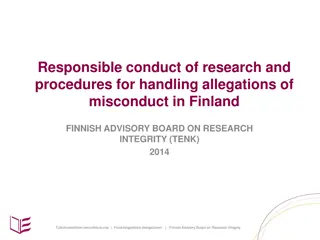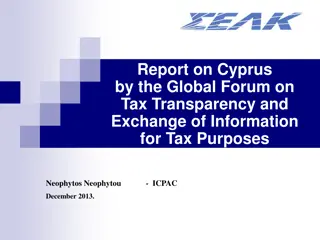OECD-UN-EU Regulations on Responsible Business Conduct
Key messages from international rulemaking on responsible business conduct, including the evolution of RBC standards, 2023 updates, regulatory activities, and the importance of international investment and trade in achieving sustainable development goals.
Download Presentation

Please find below an Image/Link to download the presentation.
The content on the website is provided AS IS for your information and personal use only. It may not be sold, licensed, or shared on other websites without obtaining consent from the author.If you encounter any issues during the download, it is possible that the publisher has removed the file from their server.
You are allowed to download the files provided on this website for personal or commercial use, subject to the condition that they are used lawfully. All files are the property of their respective owners.
The content on the website is provided AS IS for your information and personal use only. It may not be sold, licensed, or shared on other websites without obtaining consent from the author.
E N D
Presentation Transcript
bmaw.gv.at OECD-UN-EU Regulations on Responsible Business Conduct Key messages from international rulemaking Irene Janisch Federal Ministry for Labour and Economy Vienna, September 11th, 2023
bmaw.gv.at Overview Introduction: The OECD Guidelines for MNEs for RBC Why international investment and trade? How to deal with adverse effects of business activities? First Steps The development of RBC standards in the 1970s Differences between the OECD, ILO and UNCTAD approach Evolution of the modern approach to RBC since 2000 The 2023 update of the OECD GL Global RBC standards as a reference for national regulations Some recent regulatory activities regarding RBC The EU Corporate Sustainability Due Diligence Directive (CSDDD) Conclusion: Some Take Aways 2
bmaw.gv.at Introduction: The OECD Guidelines for MNEs for RBC Recommendations from governments to enterprises on how to act responsibly Dating back to 1976, several updates, latest in June 2023 51 adherents countries, 50% of global GDP, 61% of trade, 80% of international investments worldwide Only comprehensive international RBC standard, covering all areas of business activity, all enterprises Unique non-judical grievance mechanism (National Contact Points) Fully compatible with all relevant international instruments 3
bmaw.gv.at Why international investment and trade? Considerably contributed to the development of all countries MNEs contribute to economic and social development World needs 4 trillion US-Dollars per year to achieve the 2030 Agenda 4
bmaw.gv.at How to deal with adverse effects of business activities? Legitimate business activities can have adverse societal and environmental impacts. Dealing with these is nothing new: 70 Austrian Stock Corporation Act Neither is the contrary view: The business of business is business and nothing but business. (Milton Friedman) 5
bmaw.gv.at First steps The development of RBC Standards in the 1970s Negotiations for a UN Code of Conduct for Transnational Corporations failed ... ... but led to: OECD GL for MNEs 1976 ILO Tripartite Declaration on MNEs and Social Policy 1977 UNCTAD Principles on Restrictive Business Practices 1980 All are non-binding and in line with regulatory frameworks in developed countries at the time. 6
bmaw.gv.at Differences between the OECD, ILO and UNCTAD approach OECD GL are different: broad umbrella -approach most ambitious only instrument with implementation mechanism NCPs promote the OECD GL and offer good services: Since 2011 650 cases in 100 countries. participatory character with strong involvement of stakeholders including NGOs 7
bmaw.gv.at Evolution of the modern approach to RBC since 2000 (1) 2000 review of OECD GL broadened applicability, institutionalized role of NGOs 2011 UN Guiding Principles on Business and Human Rights (UNGP) Three pillars: Protect, Respect and Remedy 1. Duty of states to protect against HR abuses 2. Responsibility of companies to respect HR 3. Duty of states to provide access to effective remedy for those affected by business-related HR-abuses 8
bmaw.gv.at Evolution of the Modern Approach to RBC since 2000 (2) 2011 Revision of OECD GL: Strong chapter on HR, in line with UNGP Introduction of supply chain responsibility and Risk-based due diligence 2011 OECD Due Diligence Guidance on Conflict Minerals: Practical support to enterprises 2018 Horizontal OECD Due Diligence Guidance 9
bmaw.gv.at Evolution of the Modern Approach to RBC since 2000 (3) Contours of international framework for RBC are emerging: OECD: The business of business goes beyond business. UNGP: Duties of governments ( to protect ) and private sector ( to respect ) and victims right to remedy Both: Responsibility encompasses risk-based supply chain due diligence OECD: State have to assist enterprises to fullfill their responsibility 10
bmaw.gv.at The 2023 Update of the OECD GL Alignment with international goals on climate change and biodiversity Extension of risk-based due diligence to technology and all forms of corruption Clarification that due diligence also extends downstream Better protection for at-risk people and groups 11
bmaw.gv.at Global RBC standards as a reference for national regulations International RBC standards create no legally binding obligations for enterprises. States are free to regulate RBC in national laws and regulations including binding provisions and sanctions. Role of international standards: to ensure coherence to create a level playing field for all actors to enhance predictability + transparency to minimize implementation costs 12
bmaw.gv.at Some recent regulatory activities regarding RBC 2010 US Dodd-Frank-Act California Transparency in Supply Chains Act 2015 UK Modern Slavery Act 2017 French Loi de Vigiliance 2021 US Uyghur Forced Labor Prevention Act German Supply Chain Responsibility Act 13
bmaw.gv.at The EU Corporate Sustainability Due Diligence Directive (CSDDD) EC proposal in early 2022, Council position in December 2022, EP position in June 2023, Trilogue aiming for agreement by the end of 2023 What obligations for companies? Corporate duty to conduct risk-based due diligence for own operations and within their chain of activities/value chains Which companies will the CSDDD apply to? EU-companies: 500+ employees, EUR 150 mill.+ turnover; 250+ employees, EUR 40 mill. turnover, at least EUR 20 mill. in high-impact sectors Non-EU-companies: EU instead of worldwide turnover thresholds 14
bmaw.gv.at The EU Corporate Sustainability Due Diligence Directive (CSDDD) Phased application: 3 years after entry into force for companies with +1.000 employees and worldwide net turnover of EUR 300+ million 1/2 years later for smaller companies How will the new rules will be enforced? Administrative supervision Civil liability Major open issues: Scope of application, value chain vs. chain of activities , adressing climate change, sanctions, burden of proof, extent of civil liability Pr sentationstitel 15
bmaw.gv.at Conclusion: Some Take Aways Significant increase in cross-border investment flows needed. How to deal with potential adverse impacts remains urgent issue. RBC is here to stay and is becoming an important factor for attracting financing. More RBC regulations, effecting more enterprises, are about to be adopted. The EU CSDDD has the potential to become a game changer. The OECD GL as the most important international RBC instrument can contribute to coherence, level playing field, predictability, transparency and reduced implementation costs. Governments and academia have key roles to play in supporting the effective implementation of RBC. 16
bmaw.gv.at Thank you! I am happy to take your questions. Irene Janisch Federal Ministry for Labour and Economy Irene.Janisch@bmaw.gv.at
